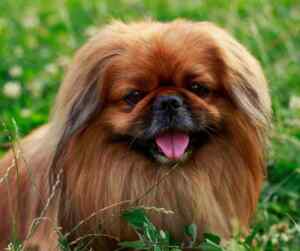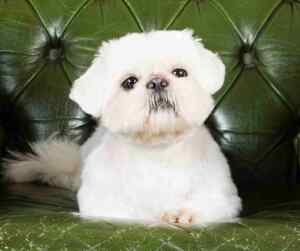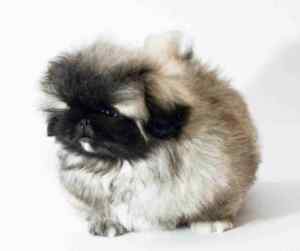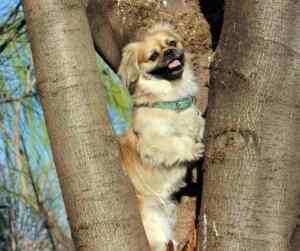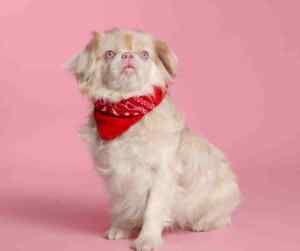All About the Pekinese Dog Breed
Welcome to our comprehensive guide about the Pekingese dog breed. Prepare to immerse yourself in the fascinating world of this small yet imperial breed, known for its unique appearance and rich history. This guide offers a plethora of information about Pekingese dogs, including historical context, detailed descriptions of the breed’s unique physical characteristics, lifespan, and even fun facts.
Additionally, we have included numerous high-quality photos that truly capture the Pekingese’s distinct charm, allowing you to truly appreciate the breed’s beauty.
Our guide doesn’t stop at just describing the breed; instead, it delves into the practical aspects of owning a Pekingese. From understanding the breed’s unique temperament to learning about potential health concerns, this guide is designed to help prospective and current Pekingese owners make informed decisions.
We also provide an overview of the care needs of a Pekingese, including grooming requirements, exercise needs, and dietary considerations. Plus, for those considering purchasing a Pekingese, we’ve included information on average prices from reputable breeders.
But that’s not all! This all-inclusive guide also features articles and resources to further enhance your knowledge about this majestic breed. Looking for the perfect name for your new Pekingese puppy? Our compilation of breed-specific names might provide the inspiration you need.
Whether you’re a longtime Pek Pekingese dogs ingese enthusiast or someone who’s just discovered the breed, this guide is a valuable resource. Dive in and discover everything there is to know about the Pekingese dog breed.
History of the Pekingese Dog Breed
Once upon a time, in the mystical land of China, a lion fell in love with a monkey. Their offspring? The Pekingese dog breed. Okay, maybe that’s just the legend, but the Pekingese breed has a history as rich and fascinating as that tale. These dogs were the cherished companions of Chinese royalty, and the common folk were not allowed to own one.
If anyone dared to steal one, they paid the ultimate price – their lives. Now, thank goodness, we can all enjoy the company of these regal dogs without fear of the guillotine!
Appearance of Pekingese Dogs
Pekingese dogs are the perfect blend of charm and dignity, with a dash of sass. These pups are compact and heavy-boned with a mane of hair that would make any lion jealous. They sport a squished, but adorable, “lion’s face,” complete with deep-set, expressive eyes that seem to reveal ancient wisdom.
Their coat is long, thick, and comes in a variety of colors. The Pekingese strut around with a distinctive waddling gait, like a tiny, hairy Beyoncé on the runway.
Pekingese Photos Gallery
Temperament of Pekingese Dogs
Despite their small size, Pekingese dogs have a big-dog attitude. They are courageous, confident, and somewhat aloof, making them the Marlon Brandos of the canine world. They are fiercely loyal to their families and can be wary of strangers. However, once they decide you’re part of their pack, they’ll shower you with love and snuggles.
Training the Pekingese Dog
Training a Pekingese is like negotiating with a stubborn but adorable toddler. They’re intelligent and can learn quickly, but they also have a strong independent streak. The key to successful training is patience, consistency, and a good sense of humor. Remember, Pekingese dogs respond better to positive reinforcement methods, so keep a stash of treats handy!
Pekingese Health Concerns
Pekingese dogs can be prone to several health concerns that potential owners should be aware of. Their unique physical characteristics, such as their flat face (they are a brachycephalic dog breed), short legs, and long back, contribute to a range of health issues that can affect their quality of life.
One of the most significant health concerns for Pekingese is their susceptibility to respiratory problems due to their brachycephalic nature. This condition is characterized by a shortened head and flattened face, which can lead to narrowed nostrils and elongated soft palates. As a result, Pekingese often suffer from breathing difficulties, snoring, and can be intolerant to exercise and heat. They are also at a higher risk for Brachycephalic Obstructive Airway Syndrome (BOAS), which can be severe and may require surgical intervention to improve airflow.
In addition to respiratory issues, Pekingese are prone to a variety of other health problems. Their bulging eyes are vulnerable to injuries and disorders such as ulcers and keratitis. Their long backs make them susceptible to intervertebral disc disease (IVDD), which can cause pain, nerve damage, and even paralysis. Regular veterinary check-ups are important for early detection and management of these conditions. Moreover, Pekingese can suffer from heart issues, including mitral valve disease, and are also prone to obesity due to their small stature and potential for a sedentary lifestyle. Proper diet and exercise are crucial to maintaining their overall health and preventing weight-related complications.
Nutrition for Pekingese Dogs
Feeding a Pekingese dog is less about quantity and more about quality. These little fellas don’t need a lot of food, but they do need the right kind. Opt for high-quality commercial dog food that’s appropriate for their age, size, and activity level. And remember, despite their royal lineage, Pekingese dogs are not immune to obesity. So, be mindful of those treat rewards!
Feeding a Pekingese dog is not so much about giving them large amounts of food, but more about ensuring that the food they consume is of the best quality possible. These pint-sized companions don’t require huge servings, but what they do need is proper nutrition that is specifically suited to their needs.
It’s recommended to choose premium commercial dog food that is suitable for their specific age, size, and activity level. There are a variety of dog food brands in the market that cater to these specific needs. For instance, puppy Pekingese would require food that boosts growth and development, while an adult Pekingese would need food that maintains their health and caters to their energy needs.
Moreover, it’s crucial to remember that Pekingese dogs, despite their regal ancestry, are not exempt from health issues such as obesity. This breed has a tendency to put on weight easily, which can lead to other serious health complications like heart disease, diabetes, and joint problems. Therefore, it’s important to monitor their food intake and ensure they’re getting just the right amount.
Another point to keep in mind is to be careful when it comes to giving them treats. While treats can be a great way to reward your pet for good behavior or used as a training tool, too many can contribute to weight gain. Opt for healthy treats and always consider them as part of their daily calorie intake.
Lastly, never forget to provide plenty of fresh water for your Pekingese. Like any other dog, they need to stay properly hydrated to help them digest their food and keep their bodies functioning properly.
In conclusion, feeding a Pekingese dog is less about filling their bowl to the brim with food, and more about providing them with a balanced, high-quality diet that is proportionate to their size, age, and activity level. With careful monitoring and a focus on quality, you can ensure your Pekingese stays healthy and happy.
Grooming Needs of Pekingese Dogs
Pekingese dogs come with a fabulous coat that needs regular maintenance. Their long, double coat requires brushing several times a week to prevent mats and tangles. Regular grooming not only keeps your Pekingese looking like a canine supermodel but also helps to reduce shedding and skin problems.
The Pekingese dog breed is known for their glamorous and fabulous coat, which is one of their most distinguishing features. This coat, however, doesn’t stay fabulous on its own. It requires regular maintenance and attention to keep it healthy and looking its best.
The coat of a Pekingese is a long, double coat, which means it has both a coarse outer coat and a softer, fluffier undercoat. This type of coat is particularly prone to mats and tangles, which can be uncomfortable for the dog and may lead to skin problems. Therefore, it is important that owners brush their Pekingese’s coat several times a week to prevent these issues.
Brushing a Pekingese’s coat is not a quick task, but it is a necessary one. Owners may want to invest in a good quality brush and comb designed specifically for long-haired breeds. Brushing should be done gently and carefully to avoid causing discomfort or damaging the coat. Owners should also be prepared to deal with any mats or tangles they come across. These should be gently teased apart with a comb, or in severe cases, may need to be cut out.
Regular grooming is not just about maintaining the look of the Pekingese’s coat, it also has several health benefits. Regular brushing helps to distribute the dog’s natural oils throughout the coat, which helps to keep it healthy and shiny. It also helps to remove loose hairs, which can reduce the amount of shedding around the house.
In addition, regular grooming allows owners to check their Pekingese for any signs of skin problems, such as dryness, redness, or rashes. It also gives owners a chance to check for any external parasites, such as fleas or ticks.
In conclusion, grooming a Pekingese’s fabulous coat is a commitment, but it is one that comes with many rewards. Not only does it keep your Pekingese looking like a canine supermodel, but it also helps to keep them healthy and comfortable. With regular grooming, a Pekingese’s coat can continue to be one of their most stunning features.
Exercise Needs and Mental Stimulation for Pekingese Dogs
The Pekingese is a breed that is renowned for its regal demeanor, charming personality, and its compact size. Despite their small stature, these dogs are known for their lion-like courage and self-confidence. However, like every other breed, Pekingese dogs also require regular exercise and mental stimulation to maintain their physical health and mental well-being.
Exercise Needs:
Pekingese dogs are not the most active breed, but they still require regular exercise to keep them fit and healthy. Daily walks are necessary, but they should be done at a leisurely pace and not for too long. Their small size and brachycephalic (flat-faced) nature mean they can struggle with intense physical activity and can overheat easily.
In addition to walks, Pekingese dogs also enjoy playtime. They love games that involve toys or small fetch games. This type of exercise not only helps them stay active but also strengthens the bond between them and their owners.
It’s important to be aware of the Pekingese’s physical limitations and not push them beyond their comfort zone. Due to their specific physical characteristics, they can have respiratory problems and they are also prone to obesity, so regular exercise is key.
Mental Stimulation:
Mental stimulation is equally important for Pekingese dogs. Without it, they can become bored and potentially destructive.
Interactive toys can be a great way to keep a Pekingese mentally stimulated. Puzzle toys that dispense treats can keep them entertained for hours. Also, toys that they can chew on will not only keep them busy but also help with dental health.
Training sessions are another excellent way to provide mental stimulation. Pekingese dogs are intelligent and eager to please, so they respond well to positive reinforcement training methods. Short, consistent training sessions can help keep their mind sharp and engaged.
Socialization is also a crucial part of a Pekingese dog’s mental health. Regularly exposing them to various people, environments, and other animals can help them develop into a well-adjusted, confident dog.
In conclusion, while Pekingese dogs may not be the most physically demanding breed, they still require a balance of regular exercise and mental stimulation. By meeting these needs, you can ensure your Pekingese is happy, healthy, and living their best life.
Care Requirements for Pekingese Dogs
Like any dog, the Pekingese requires regular vet check-ups and vaccinations. Their unique facial structure can make them prone to respiratory issues, so it’s important to keep their living environment cool and not overly exert them.
Health Concerns for the Pekingese Dogs
Pekingese dogs are generally healthy but they are prone to certain genetic health conditions such as brachycephalic syndrome, heart problems, and eye issues. Regular health check-ups and a healthy lifestyle can help prevent these.
Finding and Choosing a Pekingese Puppy
Choosing the right Pekingese puppy requires a bit of investigative work, akin to a detective’s job. This process is necessary to ensure you’re bringing home a healthy, well-adjusted pup that will grow into a great adult dog.
The first step is to always opt for a reputable breeder. This is crucial because reputable breeders are committed to producing healthy puppies. They’re knowledgeable about the breed’s health problems and do their best to breed dogs that are free from genetic diseases. Ensure they can provide health clearances for both parent dogs. These health clearances are proof that a dog has been tested for and cleared of a particular condition.
Meeting the puppy’s parents is also an essential part of the process. Observing the parent dogs can give you a good idea of how your puppy will behave and look when it grows up. The temperament of the parents can give you an insight into your potential puppy’s personality. If the parents are friendly and well-behaved, it’s a good sign that the puppy will be too.
Observing the pup’s behavior is another important step. A well-socialized puppy should be outgoing and eager to interact. If a puppy appears to be shy, fearful, or aggressive, it may be a sign of poor socialization or potential behavioral issues.
Lastly, don’t be afraid to ask the breeder lots of questions. A good breeder will be happy to answer any questions you have about the puppy’s lineage, health, and care. These could include questions about the puppy’s diet, vaccination schedule, and any specific care requirements for the Pekingese breed.
Remember, choosing the right Pekingese puppy involves making sure that the breeder you’re working with is reputable, the parents have a good temperament and are healthy, and that the puppy itself is well-socialized and appears to be in good health.
Is the Pekingese the Right Dog Breed for Me?
If you’re looking for a calm, independent, and loyal companion who’s got a streak of royal sassiness, then the Pekingese could be your perfect match. They’re great for apartment living and are excellent companions for those leading a more sedentary lifestyle.
The Pekingese breed is best known for its unique personality, which combines an aura of calmness and independence, coupled with a hint of royal sassiness. These traits can make them an ideal companion for those who appreciate a pet with a distinctive personality. If you’re someone who enjoys the company of a loyal yet independent pet, then the Pekingese could be the perfect match for you. Their calm demeanor paired with their sassy attitude makes them a unique and loveable breed.
One of the notable attributes of the Pekingese is their adaptability to apartment living. Unlike more active breeds that require large amounts of outdoor space to run and play, the Pekingese are quite content in smaller, indoor environments. They do not require extensive exercise and are quite satisfied with short walks and indoor playtime. This makes them a great choice for individuals or families living in apartments, condos, or other small living spaces.
Furthermore, the Pekingese breed is an excellent companion for those leading a more sedentary lifestyle. They are not a high-energy breed and are quite happy to spend their days lounging around the house. If you’re someone who prefers quiet evenings at home or works from home, a Pekingese could be a great fit. They don’t require constant attention and are quite content to sit by your side or relax independently, making them great companions for individuals who live a more relaxed or sedentary lifestyle.
The Pekingese breed is known for their loyalty to their owners. They form strong bonds with their human families and are known to be quite protective. This loyalty can make them a wonderful companion for those looking for a pet that will be a dedicated member of the family. Their royal sassiness adds a touch of charm to their personality, making them not just pets, but entertaining companions.
In conclusion, if you’re looking for a pet that is calm, independent, and loyal, with a dash of sassiness, the Pekingese could be your perfect match. They are ideal for apartment living and are excellent companions for those who lead a more sedentary lifestyle.
Further Reading and Other Reliable Online Resources on Pekingese dogs
For more information, check out the American Kennel Club’s page on Pekingese dogs or the Pekingese Club of America‘s website. Both offer a wealth of information on this breed.
Thanks for checking out our Pekingese dog breed information guide! We hope you’ve learned a thing or two about these regal doggos. Remember, no matter the breed, every dog deserves a loving, caring home.

